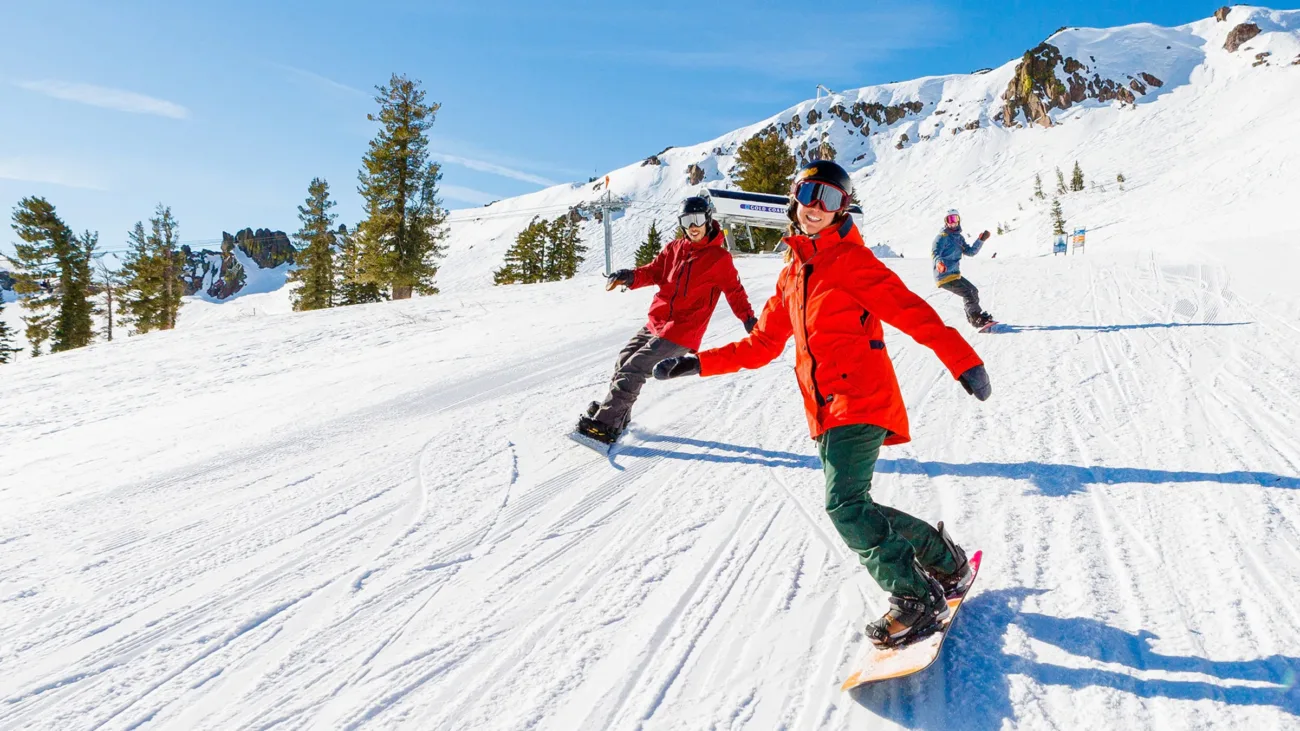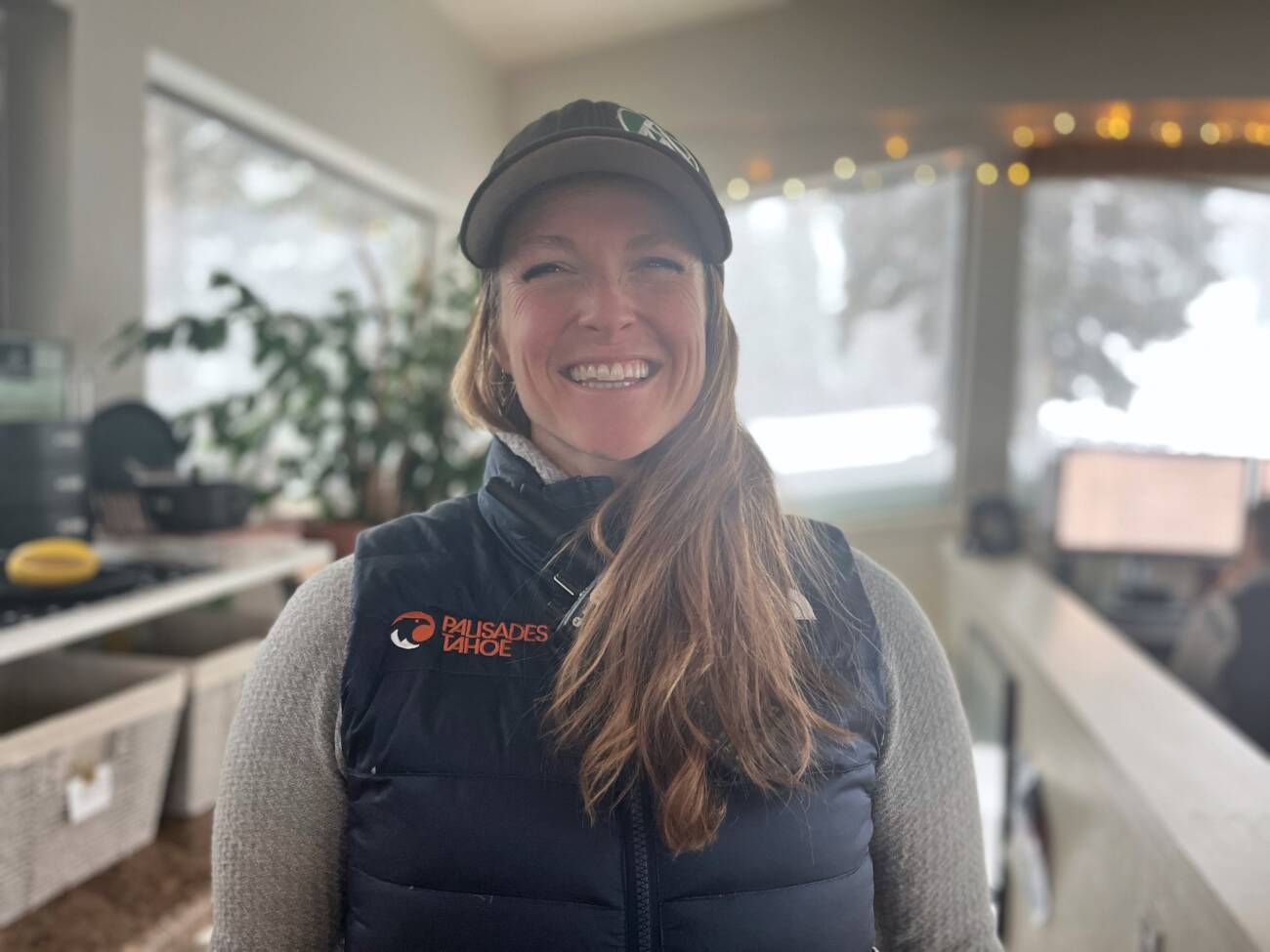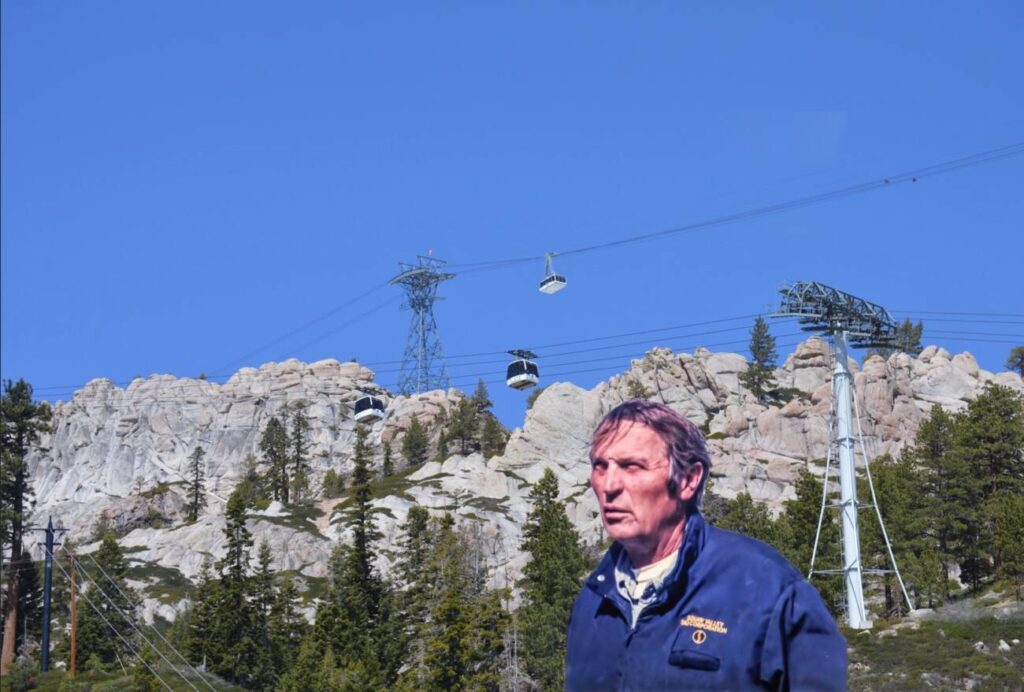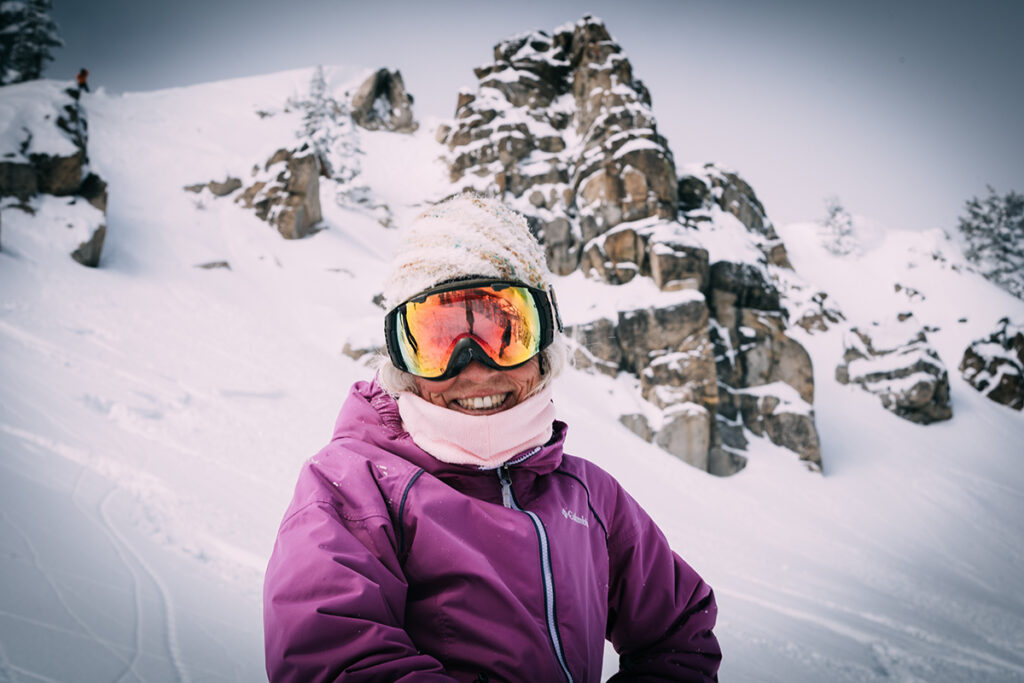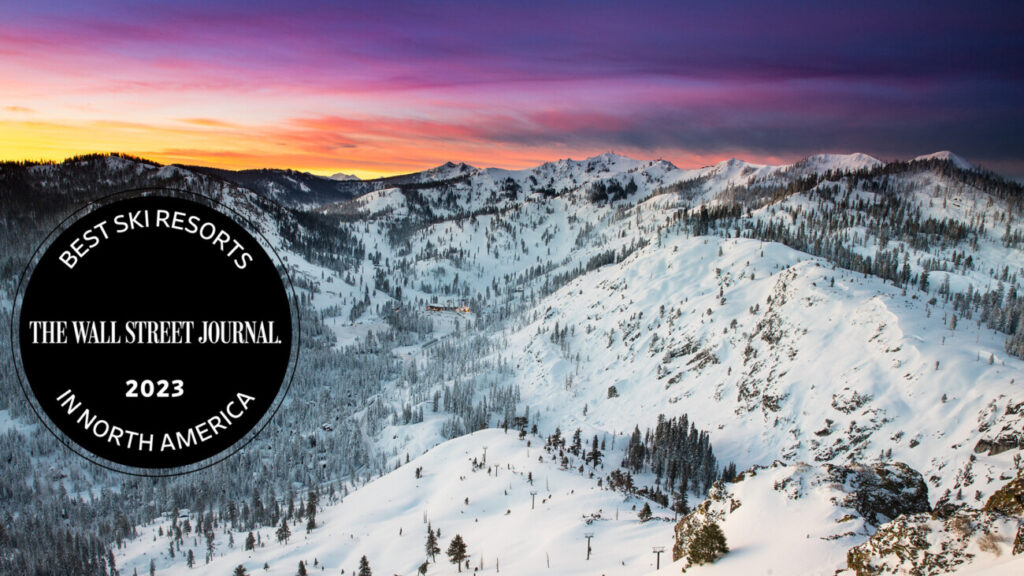Name: Eva Graves
Job Title: Dispatch Manager + Mountain Operations Administrative Assistant
Department: Mountain Operations
How many seasons have you been at Palisades Tahoe?
This is my 13th season.
How did you end up in the Lake Tahoe area?
Interestingly enough, I didn’t grow up skiing. At the young age of 21, I needed to add some winter activities to my college resume, so in 2007, I got a job working at Snowshoe Mountain in West Virginia. There, they taught me how to ski and teach for the next three seasons.
In 2010, my friends and I decided we needed bigger mountains. We checked the Farmer’s Almanac to see where in the country there would be the most snow that winter. Lake Tahoe was the spot.
We all got jobs and drove across the country. I began my career at Alpine as a Ski Instructor and Ski Team Coach, then switched to just Coaching until 2018.

How did you become the Mountain Operations Admin?
In 2018, I blew my knee out while coaching. For a short period of time, I was the Office Assistant for Lemon Hynds, Alpine Lift Operations Manager. There was a need for an extra dispatcher so I went up to the top floor of the employee building to help out there.
After finishing out the season in Dispatch, Jeff Goldstone, Alpine Meadows Mountain Manager, needed an administrator. There wasn’t a position created for this at Alpine at that time, but at Palisades, there had been a position like that for a while. The company created the position. I applied and accepted the job. The position grew over time, adding more tasks. Eventually, it incorporated being the Dispatch Manager, so now I do both of these jobs.

What does an average shift look like for you this winter?
I wake up at 3:45am, leave my house no later than 5am (I live down the hill in Sparks). On Avalanche Control mornings sometimes it’s earlier, or sometimes I stay overnight on the mountain. Normally arrive at the mountain by 6am. I try to get there earlier on avalanche control days, depending on the needs of the mountain. The first thing we do is check in with the Groomers and see what is happening out on the hill. Each day is unique. You never know what could be happening.
On Avalanche Control days, our first meeting is at 6:30am with Patrol and the day unfolds from there. Depending on the snowfall/snowpack, overnight weather, and current conditions, we announce to all employees what areas are on restriction (sometimes employee movements are restricted based on hazards.) Ski Patrol will fire the Gazex Avalanche Control System, then our Patrollers go out on their control routes. The morning continues with us managing where people are on the hill and in the base area.
We take phone calls, update the website and send emails, keeping people up to date on whatever might take place until opening. Basically, we’re answering: What needs to happen to get the mountain open? We are the communication hub, assisting all departments to make it happen.
So far in the month of March, we have only had two mornings that were NOT Avalanche Control days. With that comes tons of communication in a wide variety of avenues to ensure all persons at the company are current on what is happening on the mountain and how it will impact them and their department/operations. If someone does not know of restrictions or chooses not to abide by them, they could be seriously injured or killed. This is something we take extremely seriously.
15 minutes prior to opening, we do a check-in with each mountain operations department. Over the radio, we’ll see if they’re ready for the lifts to open or if there are any issues or challenges (like broken down snowcats, power outages, rime ice on chairs, etc.) We go around the table in the same order every morning for status reports: Terrain Parks, Lift Maintenance, Base to Base Gondola, Grooming, Patrol, and Lift Ops.

Then, after opening, the day could be anything. In Dispatch, we monitor 3 radio channels, 6 phone lines, 1 cell phone, and our individual computers (emails, messenger, website). Monitoring the radio is the most important part of the job, on top of answering questions from other departments, keeping all departments informed on operations throughout the day, managing the lift status on the website, finding lost people, getting hurt persons help, assisting non-injured skiers in need, calling ambulances and helicopters, or in the worst-case scenarios, big incidents that pull in a lot of departments and outside agencies.
We keep all departments informed throughout the day as it unfolds, and get people the resources they need. You never know what the day will bring, so you must always prepare for the unknown.
Throughout the day, we are fielding questions from EVERYBODY. When the phone rings, it could be anything from a simple question to getting help to injured parties. It could be finding a lost person in- or out-of-bounds. It could lead to us calling ambulances or helicopters. In worst cases, it could be a big incident that pulls in multiple departments and agencies.
Here’s an example of how we work with outside agencies: When we close Alpine Meadows Road for avalanche mitigation we call CalFire, California Highway Patrol, and Placer County. External contractors or companies needing access to the mountain have to go through the Mountain Manager and we then help arrange the proper access.
We document every single call that comes in throughout the day, and we are very detailed in our documentation. We really have to do some detective work here. We will get calls in for injured or lost people and they often don’t know where they are, so it is our job to figure out where they are and get Ski Patrol to them. We try to finish up around 5pm each day, but it can be later if it is an Avalanche Control day or if there are search & rescue operations ongoing.
Essentially, our job in Dispatch is to make sure that everybody has what they need on the mountain to the best of our ability.
As the Mountain Operations Administrative Assistant, I wear many hats. I assist all Mountain Ops department managers in whatever needs they may have. To sum it up, that role is a lot of tracking, purchasing, reports, information compilation, whatever the needs of the Mountain Manager and other department managers are. 2 jobs at once sushi rolled together. Never a dull moment!


What’s the best part of your job?
The best part is helping. When somebody needs something, I love being able to help. I enjoy alleviating stressors or burdens or tasks to help somebody else’s job. It’s like assisting a slam dunk in basketball. Supporting is my job. That is what I do. There is a lot of fulfillment in knowing that I made a difference for someone throughout the day.
What is the hardest part of your job?
It’s a three-way tie: Managing expectations from everybody (and myself). Saying no, because there are so many needs and requests that come in. And prioritizing when we need everything at once. I wear many hats.
What is a cool experience that sticks out as a favorite?
Last year, there was a period of time when I was the only dispatcher. During that stint, the Alpine spirit was felt in full because there was support at ALL times. My boss, Jeff Goldstone, cultivated a workplace where it feels like a family every time you walk into work and there truly is inter-departmental cohesiveness. When a department is in need, we all band together to aid however possible. It’s something I’ve never experienced in a workplace before, and I am proud to contribute to it. Whenever I was in need during that time, someone would come into the office and jump in to help. During major incidents, people check in on one another. Not just the day of, but days and weeks after. There is something truly special in the camaraderie that forms not only during everyday operations but on storm days and through incidents.

What do you do in the summer?
I’m here. This is it. Full-time, year-round. We still dispatch in the summer, but it is more of reading and reviewing, tracking capital, and purchasing. Basically, it is much more administrative work. In my Admin role, I am working on winter and summer operating plans, making sure permits are ready, managing work orders, and handling a sh*t ton of spreadsheets. We work on winter projects the whole time. There are also sometimes conferences or other continuing education.
Why do you love working at Alpine?
Jeff Goldstone. My boss has created a safe space for me to fail, and to learn, and to grow, and he encourages me to do the same with my employees. I do not hesitate to talk to my boss or my counterparts about anything. Ever. How many people can say that? That they love who you work with. And it comes from the top down – from the Mountain Manager down. Jeff cares fiercely about his employees.
What advice would you give to someone (not just women) who wants to be in the industry?
I’ve been in male-dominated industries for so long. You have to know who you are and own it.
Stay focused on your goals, and in touch with yourself. Don’t dull your shine for anyone. Do your best and do the right thing, especially when no one is watching.


